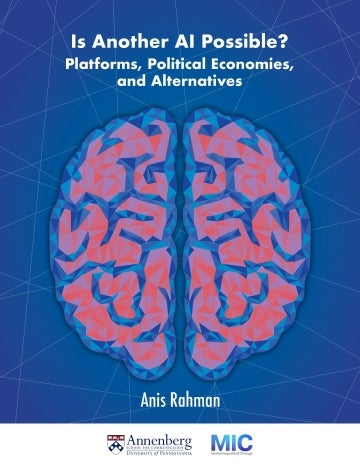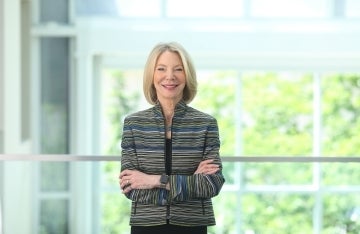The Media, Inequality, and Change Center Publishes “Is Another AI Possible? Platforms, Political Economies, and Alternatives”
The paper by Anis Rahman explores the political economy of big tech artificial intelligence.

The Media, Inequality, and Change Center (MIC) at the Annenberg School for Communication at the University of Pennsylvania is proud to present “Is Another AI Possible? Platforms, Political Economies, and Alternatives,” a paper by Anis Rahman, Assistant Teaching Professor in the Department of Communication at the University of Washington, Seattle.

Artificial intelligence (AI) is rapidly transforming industries, economies, and societies, while its development and deployment are largely controlled by a few powerful tech corporations. This concentration of power reinforces longstanding patterns of bias, inequality, labor and data exploitation, invasive surveillance, and environmental harm.
In this paper, Rahman explores the political economy of big tech AI, critiquing its industrial and regulatory capture while exploring alternative pathways that center the public interest over corporate profit. Rahman addresses the concentration of AI power, the immense human, environmental, and ethical costs of industrial AI, and offers systemic transformation possibilities for AI, including the use of cooperatives, public utility regulation, and potential policy interventions.
“As AI technologies become increasingly central to our daily lives, it’s critically important that we imagine how they can best serve human needs, not just corporate profits. Rahman’s pathbreaking political economic analysis begins that vital conversation by critiquing structural problems and introducing alternative models and democratic paradigms,” says Victor Pickard, C. Edwin Baker Professor of Media Policy and Political Economy at the Annenberg School and co-director of the MIC Center. “The MIC Center is eager to support such cutting-edge research on key policy debates about potential futures for our core information and communication infrastructures.”
About the Author
Anis Rahman is an Assistant Teaching Professor in the Department of Communication at the University of Washington, Seattle. He earned his Ph.D. in Communication from Simon Fraser University and an M.A. in Television Journalism from Goldsmiths, University of London. His research focuses on media and platform ownership and their effects on journalism and the public interest, with a particular emphasis on the Global South. His current projects explore digital authoritarianism, public internet and AI initiatives, and platform geopolitics in South Asia. Rahman has published widely in peer-reviewed journals and edited collections. He is an affiliate faculty member of the South Asia Center at the Jackson School of International Studies at UW.
About the MIC Center
Funded in collaboration between the University of Pennsylvania’s Annenberg School and Rutgers University’s School of Communication and Information, and now hosted primarily at Annenberg, the MIC Center explores the intersections between media, democracy, technology, policy, and social justice.



